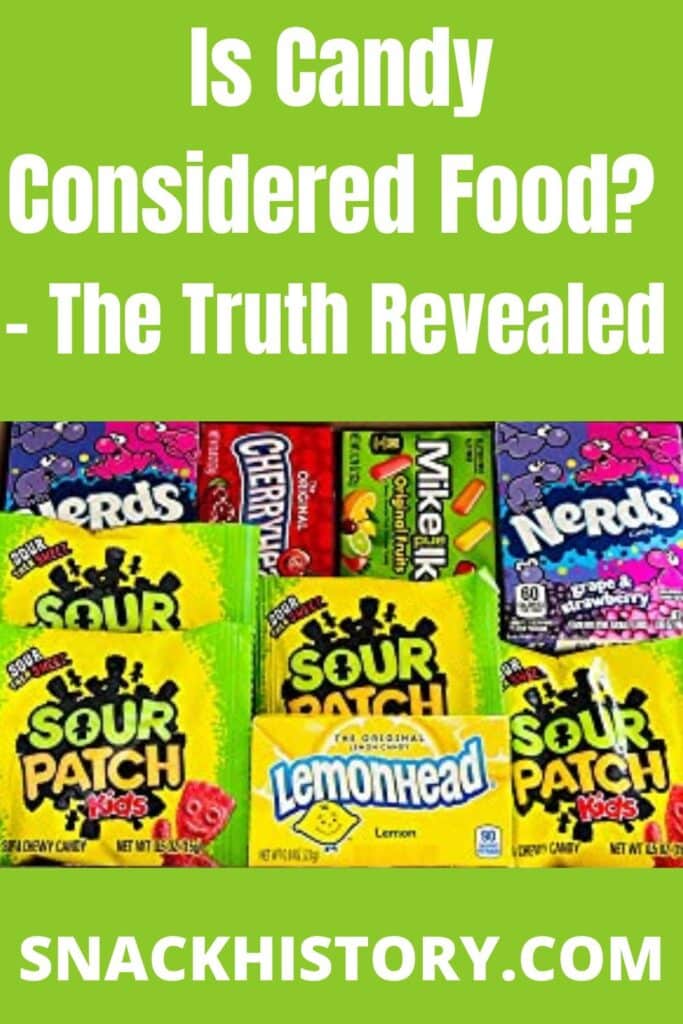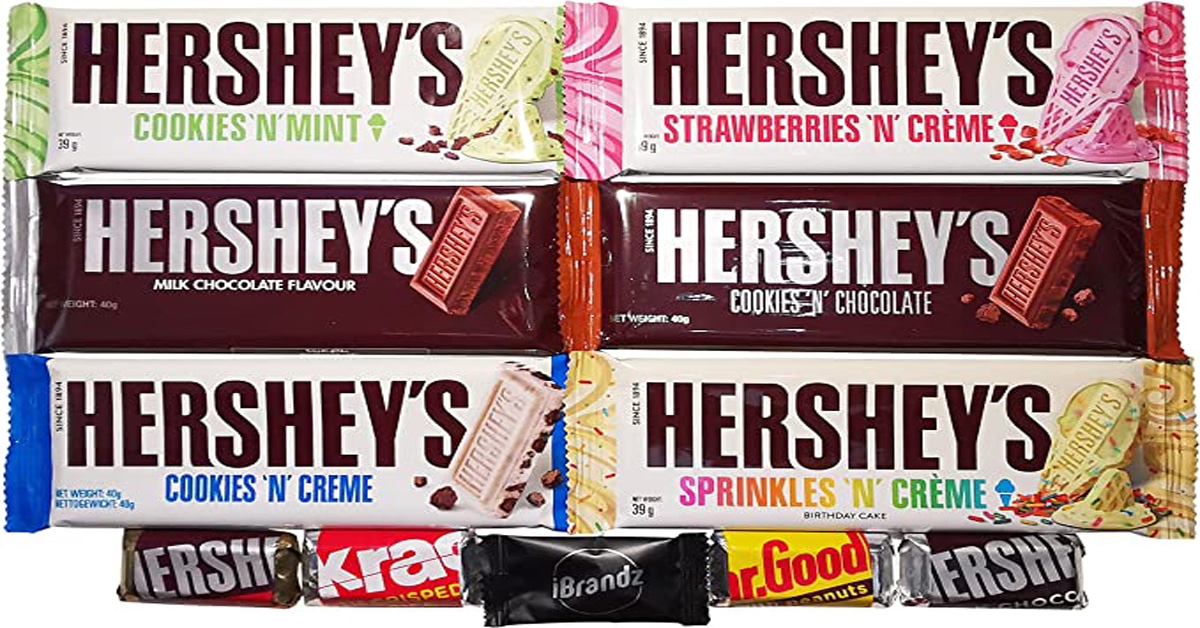Is Candy Considered Food? – The Truth Revealed
The majority of people believe that food is everything we consume. We refer to whatever we eat as food. But the truth is that science has thoroughly explained to us what food is. The way we see science is frequently incorrect. It has been debated for generations as to what is food and what is confectionery. However, have you ever wondered — is candy considered food?
To be alive and healthy, we must eat. Protein, carbs, and a variety of other nutrients found in our meals are essential for maintaining our health and vitality. Today, we’ll examine the similarities and differences between sweets and other foods to see how they relate to one another and will answer the main question: “Is candy considered food?”
Please leave a review or any memories of this snack in the comments at the bottom of this page. Thank you!

What Can Be Considered As Food?
Before we answer the question, “is candy considered food,” let’s first define what constitutes food. What characteristics do foods have?
Food is something that we consume to stay alive and develop. Any nourishing edible material that people or animals consume or drink to get energy and nourishment can be considered food. Simply said, food is everything we consume to keep alive, whether it comes from plants or animals. We eat primarily to gain nourishment, which aids in obtaining energy to remain active. In order to do our everyday tasks, we require energy.
Food items, including fruits, vegetables, and grains, come from plants. Animals provide us with food such as eggs, fish, meat, milk, cheese, and honey. Carbohydrates, fat, protein and other nutrients found in food are crucial for maintaining life and promoting growth.
You may think of food as something that makes you feel full. The majority of individuals refer to food as a substance that reduces hunger. However, the fact is that not everything that satisfies your appetite will necessarily provide you with enough nutrients for healthy growth. So, to see whether is candy considered food or not, we will need to look at its nutritional values.
For instance, you could constantly eat because you enjoy eating sugar. While eating sugar may initially make you feel full, the truth is that it cannot provide you with the nourishment you need to sustain life. In reality, consuming too much sugar can cause heart disease and blood sugar imbalances, two major health issues.
For strong bones, cartilage, hair, nails, and muscular development, we need proteins. For our bodies to have the energy to work and play, they require carbs. In addition, our bodies require lipids, vitamins, and minerals.
Misconceptions Regarding Candies
Before exploring whether is candy considered food or not, let’s first review some misconceptions that have been around for centuries. Candy is the fundamental component of pleasure, yet it is also perpetually polluted by the connotation of sin. And that vice, that “evil side“ of confectionery, has existed in many different shapes throughout history.
There were worries about candy being adulterated in the 1880s and into the early 1900s, that it was somehow contaminated by impure components like artificial coloring or clay dust in place of sugar. However, the concern regarding adulteration was much more widespread than any issues with the quality of the candy, which at the time was genuinely quite high.
During this time, there were numerous allegations of candy poisoning. When children fell ill, people alleged that the candy was to blame, and the stories appeared in all the newspapers. The National Confectioners’ Association looked into each incident and again demonstrated that there was no poison in the candy and that the child’s illness had another medical cause.
Throughout history, there have been several instances of the notion that sweets are deadly. Even though it has been a century since then, the notions of risk persist: sugar is bad, candy rots your teeth, causes cavities and leads to diabetes. Candy undoubtedly contributes to those issues, but it’s not the only one. There is a strong moralism present.
So, Is Candy Considered Food?
We still have not answered the question of whether is candy considered food or not. Your sweets might be regarded as food. You can think of your candy as food or a snack because it follows the definition of “what is food“. The sort of sugar you are consuming will determine everything.
But even with all the justifications, the issue remains: Is candy considered food? It cannot be regarded as food if it is sugar candy since sugar crystal candy has extremely little to no nutrition. On the other hand, sugary treats have several known adverse consequences.
People used to create things at home back when there was little to no technology. They manufactured sweets out of sugar and dried fruits as opposed to consuming sugar. You can eat a candy bar and classify it as food if you’re hungry. Butter, a lot of dry fruits, and even flour can all be found in candy bars. According to studies, a candy bar may provide you with just as much energy as a single meal.
Candy flavored with butter, honey, or dried fruits is unquestionably classified as food. However, as already mentioned above, one that has no nutritional value and only consists of sugar may not be counted as food.
Is Candy Junkfood?
We already know that, indeed, candy is considered food. However, some state that sweet treats are junk food. Candy is frequently viewed as an unhealthy food. Junk food has few nutrients and is rich in calories. Candy is largely composed of empty calories and has little nutritional value, so it can be categorized as junk food. Candy does include some sugar and fat, but at least some varieties may also contain the vitamins and minerals our bodies need to stay healthy.
Snack-sized candy bars might be hard to locate, but they are there. Depending on the brand you choose, the candy bar’s quality may vary, but most weigh approximately 1.25 ounces. At 2.5 ounces, Snickers, Milky Way, and Reese’s Peanut Butter Cups are a few candy bars that come in snack-size packaging. Each bar has roughly 250 calories.
Are Food and Candy the Same?
Food and candy are not the same things. When talking about food, items like bread, vegetables, milk, and the like come to mind first. We consume food that will fill us up and provide the body with enough nutrients.
Candy bars are sometimes even regarded as whole meals. A study says one candy bar can provide you with the same nutrients as your midday meal. The benefits of consuming candy bars are numerous. In comparison to a whole meal, it is less expensive, requires little preparation time, and provides enough energy for work. However, not all candy has this kind of nutritional value. Therefore, indeed, in some cases, the answer to the question “is candy considered food” is positive.
Sugar confectionery is a category that includes sweets. They are also known as lollies, sweets, or candies. Any sweet treats made of sugar, chocolate, or chewing gum are included. The majority of individuals consume candy for fun and pleasure. They can cure the cravings for something sweet. Some people consume best selling candy bars as snacks, while others have them for lunch in the afternoon. Candy is very sweet and even addicting, yet it is really bad for your health if consumed in large quantities.
Is Candy A Snack?
In addition to the question “is candy considered food or not”, you may also be wondering, is candy a snack? Candy is a snack. Sugar is the main component of candy. As a result, Americans frequently see it as a snack or even dessert. Everything depends on when and how you consume candy. It would be your dessert if you were to eat it after a meal. Candy consumed in between meals is referred to as a snack.
Even while some people argue that candy shouldn’t be classified as a snack because of how many calories it contains, candy does help satiate hunger for a few hours. Some may even substitute sweets for breakfast or lunch. They continue to consume three meals and three snacks each day while they do this.
Snacks are frequently described as relatively bite-sized foods that are not consumed as the main course of a meal. A snack might consist of just one or two things, like carrot sticks or an apple. A sandwich made with whole grain bread rather than white bread, crackers with nut butter, cheese slices, and raw veggies are some examples of snacks. However, is candy considered food or a snack?
It can be handy to consume anything in a wrapper or in a cup that is simple to open and doesn’t involve a lot of extra work when you just have a short amount of time to eat between meals. For instance, rather than preparing breakfast at home in the morning, many individuals just grab a granola bar on the way out.
Bottom Line – Is Candy Considered Food?
Now you already know the answer to the question “is candy considered food”. The truth is that even if it’s considered food, you can think of certain candies as food, but not all. Food and candy are two distinct terms. Even candy is a form of food, and people eat it for dessert or as a snack. Some types of candies can also be considered junk food.

Nato is a content writer and researcher with a background in psychology. She’s passionate about writing about the candy industry and exploring the cultural significance of sweets and treats. She believes that the stories behind our favorite snacks can reveal a great deal about our values.
Please leave a review or any memories of this snack in the comments below. Thank you!
Click here for a full A-Z list of Snacks and Candy
